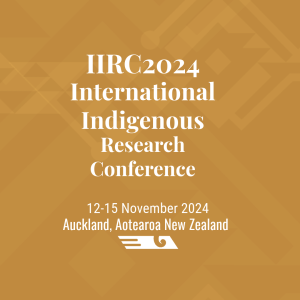
Ngā Pae o te Māramatanga is proud to host the IIRC2024 Conference at Waipapa Marae, University of Auckland
After navigating the challenges of the COVID-19 pandemic, we’re excited to return to an in-person format, fostering connections and solidarity among Indigenous researchers. Since our last in-person conference in 2018, we’ve embraced online formats in 2020 and 2022, but nothing replaces the richness of face-to-face interactions.
https://www.iirc.ac.nz
Ngā Pae o te Māramatanga (NPM) is the founding host of the biennial International Indigenous Research Conference (IIRC). The IIRC has a well established reputation as the premier international Indigenous conference and consistently attracts high numbers of national and international participants. IIRC is a time for reflection, sharing, planning, innovating. IIRC offers participants a range of engagement modes: master classes, premiere keynotes, guest speakers and time to connect and renew. As a deeply related community of Indigenous researchers internationally, we come together in the one place every two years, at Waipapa marae, Waipapa Taumata Rau - The University of Auckland, Aotearoa New Zealand.
Whītiki Taua : Research Solidarities
“Whītiki Taua” is our conference theme. It embodies the bond and collective strength within communities, while “Research Solidarities” emphasises collaborative research endeavours within Indigenous contexts. Together, they symbolise the power of solidarity, knowledge sharing, and collective empowerment.
Join us as we explore meaningful partnerships, uphold Indigenous perspectives, and work together to address common challenges. Let’s contribute to the well-being and empowerment of Indigenous peoples through our scholarly endeavours.
Save the dates and be part of this transformative experience at IIRC2024. Further details to follow.
2022 Building the foundations for flourishing Indigenous Futures
IIRC is a time for reflection, sharing, planning, innovating, getting inspired. Everything about our conference is Indigenous. Hot topics include: climate change, living sustainably, Indigenous rights and wellbeing, Indigenous data sovereignty, Indigenous distinctiveness, and building firm foundations for flourishing Indigenous futures.
Below are listed our previous conferences with links to our media centre where you will find a treasure trove of keynote addresses from leading Indigenous researchers from around the world.
2020 Gathering of Indigenous Minds (Online)
NPM is committed to holding the 9th Biennial International Indigenous Research Conference (IIRC20) in November 2020. The challenges we have all faced together this year has changed the nature of what is possible, but in just five months we will be hosting a unique and online "Gathering of Indigenous Minds". more
2018 Indigenous Futures
Ngā Pae o te Māramatanga New Zealand’s Māori Centre of Research Excellence (NPM) is the founding host of the biennial International Indigenous Research Conference. It is our honour to enable and host this conference to create an international stage for engagement, sharing and future shaping of globally relevant Indigenous led research. more
2016 International Indigenous Research Conference
Centred on:
- Whai Rawa – Prosperous Indigenous Economies;
- Te Tai Ao – Healthy Natural Environments;
- Mauri Ora – Indigenous Human Flourishing;
- Mahi Auaha – Creative Indigenous Innovation ; and
- Te Reo me Ngā Tikanga Māori – Thriving Indigenous Languages and Cultures. more
2014 International Indigenous Development Research Conference
Explored indigeneity and the multidisciplinary approach used for indigenous development. more
2012 International Indigenous DevelopmentResearch Conference
The 5th biennial International Indigenous Development Research Conference 2012 was held in Auckland on 27-30 June 2012, hosted by Ngā Pae o te Māramatanga, New Zealand’s Indigenous Centre of Research Excellence. The proceedings are free to download, and include nearly 40 peer reviewed papers from around the world.
2010 Kei muri i te awe kāpara he tangata kē – Recognising, engaging, understanding difference
Discussed strategies for generating social, educational, intellectual, and economic opportunities by building relationships that engage, understand, and accommodate difference to overcome the adverse effects resulting from failure to understand sufficiently the differences among indigenous and non-indigenous communities and societies. more
2008 Te Tatau Pounamu: The Greenstone Door
Focused on traditional indigenous concepts, values, ideals, models and strategies for sustaining balaned and healthy relationships within and across families, communities, nations, nation-states, local, regional and global borders, territories and environments. more
2006 Indigenous Indicators of Well-being: Perspectives, Practices, Solutions
Addressed issues, practices, models and perspectives for protecting, sustaining and nurturing traditional systems of knowledge. more